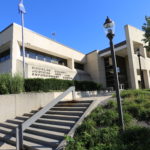Kochs, Cato Institute ready to end lawsuits
TOPEKA — The Cato Institute and billionaire shareholders Charles and David Koch announced Monday that they are close to settling two lawsuits brought by the prominent political donor brothers in their native Kansas over the ownership of the libertarian-leaning think tank based in Washington.
The parties announced that they have an “agreement in principle” that would restructure the institute, a research organization that promotes free-market, small-government policies. The Cato Institute would get a new CEO within six months; it would be governed by member-directors; and it would no longer have shareholders. Charles Koch would no longer be a director, but David Koch would remain as one.
The Koch brothers, known nationally for supporting conservative causes and candidates, are longtime shareholders in the institute. They filed their lawsuits earlier this year in Kansas, arguing that it has jurisdiction because the institute lists an office in the Kansas City suburb of Johnson County.
The parties issued a joint statement Monday saying they’ll ask a judge to put the litigation on hold after settlement documents are signed. Eventually, they expect to seek the dismissal of the lawsuits.
New CEO
The agreement would mean the departure of Ed Crane, who’s been CEO for more than three decades. John Allison, the former chief executive officer of BB&T Corp., the banking and financial holding company based in Winston-Salem, N.C., will replace him.
Crane had accused the Koch brothers of attempting to engineer a “hostile takeover” of the institute and endangering its independence. The Koch brothers said they were trying to make sure the organization remained effective and operated under the terms of shareholder agreements dating back to 1977.
The outgoing CEO praised the selection of Allison and said the institute would remain a “nonpartisan, nonaligned, independent source of libertarian perspectives on public policy.”
The lawsuits
The Koch brothers’ first lawsuit, filed in March, centered on the 25 percent ownership interest in the Cato Institute previously held by William Niskanen, who retired as chairman in 2008 and died in October. The Koch brothers contended that under shareholders’ agreements in 1977 and 1985, Niskanen’s widow couldn’t control his ownership interest and must give his shares back to the institute. That would have left only the Koch brothers and Crane as shareholders.
The second lawsuit, filed in April, involved an expansion of the institute’s board of directors, which the Koch brothers sought to block. It named the institute and four directors as defendants.
Under the agreement, Cato’s board would have 12 directors, including David Koch, and the Koch brothers would designate an additional three directors. Allison would be an additional board member and could nominate one or two additional directors. Crane would not be a director.
In its latest annual report, the Cato Institute listed 123 employees and an annual budget of about $21 million, with more than 80 percent of its funds coming from individual contributors. Crane and Charles Koch are listed as founding the institute in 1977.
Charles Koch, a Wichita resident, is chairman and CEO of Koch Industries Inc., which has about 67,000 employees worldwide and $110 billion in annual revenues, with interests that include oil refineries, fertilizer, chemicals, paper and pollution-control equipment. David Koch, who lives in New York, is the company’s executive vice president. Koch Industries is not involved in the litigation.






